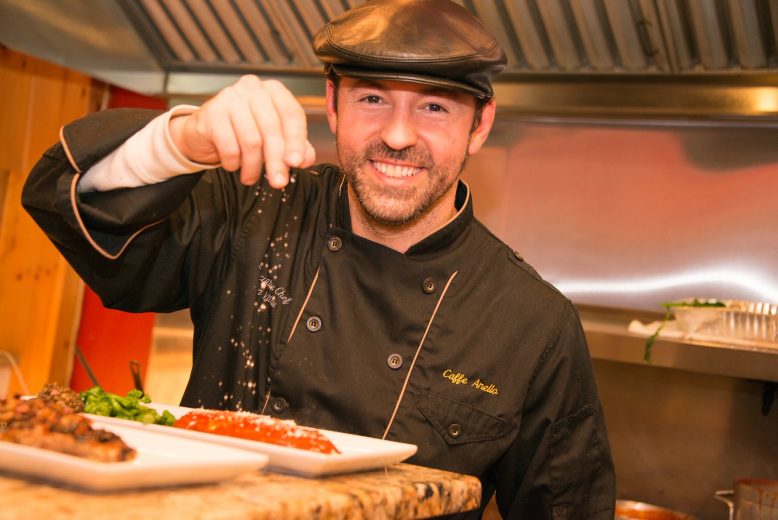
French chef (and former soldier) Auguste Escoffier developed the “brigade” system for the professional kitchen in the late 19th century. It was a militaristic hierarchy from chef de cuisine to sous chef to chef de partie on down (and down). The priority: beautifully executed cuisine. Your quality of life—or happiness, or sanity—not so much.
The basic template of the brigade stuck, but we’re finally reversing course on the “necessary misery” part (vital after a year of grim industry headlines). Part of that reversal comes with initiatives like Fair Kitchens, a project headed by Unilever Food Solutions executive corporate chef Einav Gefen, with a mission of creating a kinder (healthy, balanced, supportive) kitchen culture.
Workplace wellness has always been fundamental to chef John Vitale of Caffe Anello, among the first recruited to the Fair Kitchens professional advisory panel of chefs and industry pros. We caught up with Vitale to ask about the movement and what we can expect to see from Fair Kitchens in the New Year.
Table Hopping: How would you explain the goal of Fair Kitchens?
John Vitale: Really, what Fair Kitchens involves is directly taking on the challenges that are happening in kitchens all over the country. There’s mistreatment, substance abuse problems. It’s a high-stress environment.
TH: “The Code” on the Fair website is written out with the acronym “TEAMS”: Talk Openly; Excite Passion, Act as One, Make Time, Say Good Job.” How did it come about?
JV: We wrote it together…We literally said ‘We’re gonna come up with some type of acronym that best represents what the movement should be about.
TH: You also utilize social media as a way to engage and encourage involvement, including the #FairKitchens and #AnHourforUs hashtags.
JV: Yes, “An Hour for Us.” That’s what it’s all about, putting it all on the table, working things out together. Everybody has a say in what occurs and what happens and where we need to improve. You can have an acronym [TEAMS] on your wall, but you have to abide by it.
TH: How would you turn a new chef onto the movement?
JV: When everybody feels they have a voice in the decision-making process, you receive a lot more productivity. My managerial approach is like that. Every day, when everyone comes in, from our dish guy to our executive chef—our sous chef Matt Borgersen has been promoted—we’re all sharing that responsibility. And it’s gone very well for us. We still retain the same employees from the day we open our doors.
TH: What about the argument that great food takes sacrifice?
JV: Your treatment in a kitchen is going to not only affect you in the workplace, it transcends through product you put out, too. If you don’t have happy people working on the line…the product’s going to suffer, too.
TH: A fair place to work is an idea anyone could get behind. What’s the major challenge?
JV: Breaking the mold of this Old World mentality of kitchen treatment. There’s the yelling, the verbal abuse, frustration, emotions. But put someone down, they’re not going to forget that.
TH: Why do you think Fair Kitchens is happening now?
JV: We had to say if not now, when? We can’t continue to kick that can down the road forever. Why not create this culture, this training-management style, for young blood? Then it becomes a precedent when they open their own doors.
TH: Food writer Kat Kinsman’s Chefs with Issues provides an online forum for personal and mental health issues within, and around, the industry. How does Fair Kitchens address that?
JV: Mental health awareness is definitely a component. We met with a gentleman named Alex Hardy. He runs a mental health awareness program called Get Some Joy. Part of the movement is to be open and talk about things, but it’s not always the case that someone in your staff wants to come to you because they’re depressed or having bad thoughts or an addiction issue. This is [one] outlet for staff to have a conversation with someone outside of the kitchen world.
TH: What’s on the horizon for Fair Kitchens in 2019?
JV: The long-term goal is to make [“Fair Kitchens”] an accreditation. Part of that is getting the word out there by social media, but we’re also getting some of the better-known chefs on board. We’ve been working with James Beard Foundation chefs, people that are really relevant and have done great things for the industry. Eventually, we’re looking to have some kind of training pop-up facilities so this model can go all over—nationwide, global. We talked about becoming something where we travel and train people, people get their “Fair Kitchens” certificate. We want customers who walk in to see that on the wall.
Fair Kitchens can be followed online. John Vitale can be found running a very fairy, very happy kitchen at Caffe Anello at 11 Madison Avenue in Westwood. 201-786-8137.
